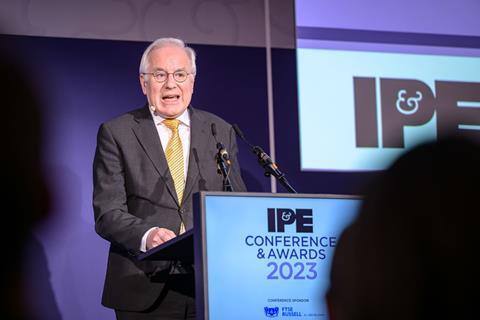The pension fund industry is facing more and more “horizontal legislation” from the European Union, which does “not sufficiently take into account proportionality and diversity within European IORPs”, said Johannes Ziegelbecker in his opening speech for this year’s IPE annual conference in Vienna.
Ziegelbecker was among those who set up the Austrian second pillar pension system in the 1990s and today he is both managing director at the Austrian Bundespensionskasse as well as member of the board of directors of PensionsEurope.
“In contrast to the IORP II directive, this horizontal legislation does not align with the necessity of minimum harmonisation for IORPs,” he warned.
However, on one of the conference discussion panels, Petra Hielkema, chair of the European Insurance and Occupational Pensions Authority (EIOPA), said: “We will stick to minimum harmonisation and will not introduce a Solvency II regime for IORPs.”
She added: “We need to correctly identify risk that comes with a long-term promise,” adding that she recognised “the need to be proportionate” as there “should be room for pension plans of a smaller size”.
As examples for such horizontal legislations, Ziegelbecker named the Sustainable Finance Disclosure Regulation (SFDR), the Digital Operational Resilience Act (DORA), and FIDA, the regulation on financial data access.
He noted these developments were “threats but also opportunities” and called on pension funds – as well as asset managers and consultants – to join the industry lobbying group PensionsEurope.

“Such a support for PensionsEurope can even be considered as a responsibility of a pension fund manager for the sake of its members and beneficiaries,” he said.
AEIP welcomes EU’s reporting review
Meanwhile the European Association of Paritarian Institutions (AEIP) has welcomed an initiative by the European Commission to ease the regulatory burden on IORPs.
In a statement, AEIP warned that “the regulatory burden on IORPs has increased significantly” since the IORP II directive took effect in 2017. It also mentions the burden caused by horizontal legislation, such as DORA – in line with Ziegelbecker’s criticism.
AEIP added: “This has detrimental effects resulting in additional financial burdens on their members and beneficiaries, ultimately diminishing pension benefits.“
Earlier this year, the European Commission launched the initiative ‘Administrative burden – rationalisation of reporting requirements’, which is open for comment and feedback until 1 December.
The initiative aims to “identify reporting requirements in EU legislation that can be removed or rationalised without undermining the policy objectives”. Regulatory burdens are set to be reduced by 25%, according to the Commission’s website.
Read the digital edition of IPE’s latest magazine


















